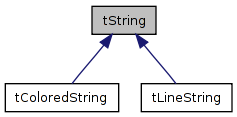
#include <tString.h>

Public Types | |
| typedef tString | THISCLASS |
| typedef for this class | |
| typedef std::string | BASE |
| typedef for base clase | |
| typedef BASE::value_type | CHAR |
| the character class | |
Public Member Functions | |
| tString () | |
| default constructor | |
| tString (const BASE &) | |
| pseudo copy constructor | |
| tString (const tString &) | |
| copy constructor | |
| tString (const CHAR *) | |
| conversion from C string | |
| template<typename T> | |
| tString (T begin, T end) | |
| initialisation by iterators | |
| WRAP_OPERATOR_ALLTYPES (+) WRAP_MUTATING_OPERATOR_ALLTYPES(+ | |
| assignment from output collector | |
| size_type | Size () const |
| Returns the size of the string in characters. | |
| template<class T> | |
| bool | Convert (T &target, size_type startPos=0) const |
| Converts the string to an arbitrary type, starting at the given position. | |
| void | ReadLine (std::istream &s, bool enableEscapeSequences=false) |
| read a whole line from a stream into this string | |
| void | Clear () |
| clears the string | |
| void | SetPos (int len, bool cut) |
| makes this string exactly of length len. | |
| bool | StartsWith (const tString &other) const |
| determines whether this string starts with the argument string | |
| bool | StartsWith (const CHAR *other) const |
| determines whether this string starts with the argument string | |
| bool | EndsWith (const tString &other) const |
| determines whether this string ends with the argument string | |
| bool | EndsWith (const CHAR *other) const |
| determines whether this string ends with the argument string | |
| tString | LTrim () const |
| returns a copy with leading whitespace removed | |
| tString | RTrim () const |
| returns a copy with trailing whitespace removed | |
| tString | Trim () const |
| returns a copy with leading and trailing whitespace removed | |
| int | StrPos (const tString &tofind) const |
| Get the position of a substring within this string. | |
| int | StrPos (int start, const tString &tofind) const |
| Get the position of a substring within this string. | |
| int | StrPos (const CHAR *tofind) const |
| Get the position of a substring within this string. | |
| int | StrPos (int start, const CHAR *tofind) const |
| Get the position of a substring within this string. | |
| tString | SubStr (int start, int len) const |
| Get an arbitrary substring within this string. | |
| tString | SubStr (int start) const |
| Get a substring within this string from the end. | |
| int | ToInt (size_type pos=0) const |
| Returns the string converted to an integer. | |
| REAL | ToFloat (size_type pos=0) const |
| Returns the string converted to a float. | |
| tString | StripWhitespace (void) const |
| Strips all whitespace from a string. | |
| tString | ToLower (void) const |
| Converts the string to lowercase. | |
| tString | ToUpper (void) const |
| Converts the string to uppercase. | |
| int | PosWordRight (int start) const |
| Computes the position of the next delimiter relative to start. | |
| int | PosWordLeft (int start) const |
| Computes the position of the previous delimiter relative to start. | |
| int | RemoveWordRight (int start) |
| Remove word right according to the delimiters. | |
| int | RemoveWordLeft (int start) |
| Remove word left according to the delimiters. | |
| void | RemoveSubStr (int start, int length) |
| Remove a substring, in-place. | |
| tString | GetFileMimeExtension () const |
| Gets the lowercased file extension, as in a MIME type. | |
| tString | Reverse () const |
| Reverses strings. | |
| tString | Truncate (int truncateAt) const |
| Returns a truncated string (copy of this with excess chars replaced by "..."). | |
| CHAR | operator[] (size_t i) const |
| CHAR & | operator[] (size_t i) |
| CHAR | operator[] (int i) const |
| CHAR & | operator[] (int i) |
| void | SetSize (unsigned int size) |
| sets the string length by cutting or appending spaces | |
| CHAR | operator() (size_t i) const |
| CHAR & | operator() (size_t i) |
| CHAR | operator() (int i) const |
| CHAR & | operator() (int i) |
| int | Compare (const CHAR *other) const |
| Compares two strings lexicographically. | |
| int | Compare (const CHAR *other, bool ignoreCase) const |
| Compares two strings lexicographically, ignoring case differences if second argument is true. | |
| operator const CHAR * () const | |
| int | Count (CHAR what) const |
| Counts the number of a certain character within the string. | |
| int | LongestLine () const |
| the length of the longest line | |
| int | Len () const |
| returns the lenghth PLUS ONE (the allocated length) | |
| void | SetLen (int len) |
| sets the allocated length | |
| void | NetFilter () |
| filters strings from the net for strange things like newlines | |
Static Public Member Functions | |
| static int | CompareAlphaNumerical (const tString &a, const tString &b) |
| Compares two strings alphanumerically. | |
Definition at line 61 of file tString.h.
| typedef tString tString::THISCLASS |
| typedef std::string tString::BASE |
| typedef BASE::value_type tString::CHAR |
| tString::tString | ( | void | ) |
default constructor
Definition at line 302 of file tString.cpp.
Referenced by GetFileMimeExtension(), and SubStr().
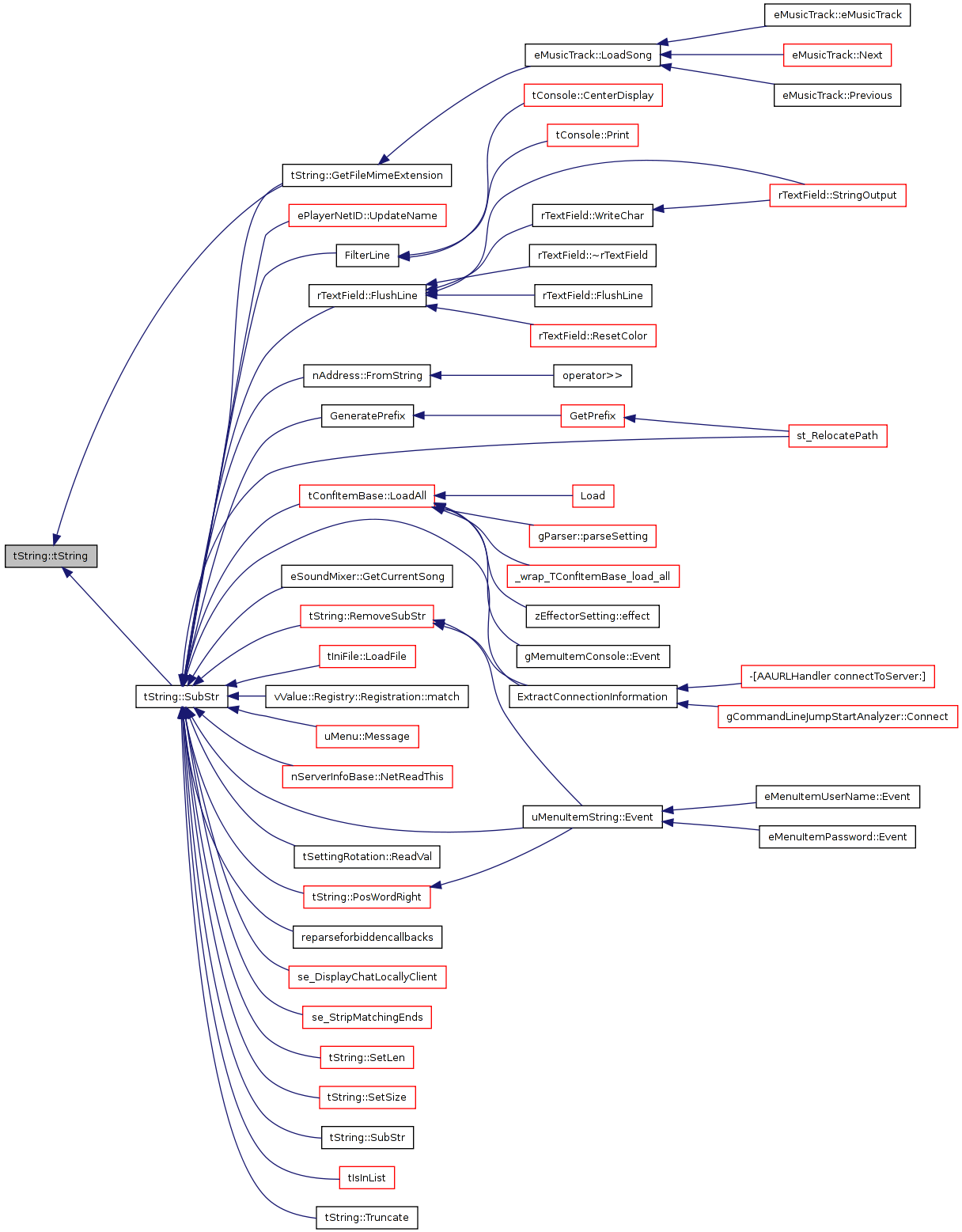
| tString::tString | ( | const BASE & | other | ) |
pseudo copy constructor
| other | source of copy operation |
Definition at line 316 of file tString.cpp.
| tString::tString | ( | const tString & | other | ) |
copy constructor
| other | source of copy operation |
Definition at line 331 of file tString.cpp.
| tString::tString | ( | const CHAR * | other | ) | [explicit] |
conversion from C string
| other | source of copy operation |
Definition at line 346 of file tString.cpp.
| tString::tString | ( | T | begin, | |
| T | end | |||
| ) | [inline] |
| tString::WRAP_OPERATOR_ALLTYPES | ( | + | ) |
assignment from output collector
| tString::size_type tString::Size | ( | void | ) | const |
Returns the size of the string in characters.
Definition at line 395 of file tString.cpp.
Referenced by FilterLine(), ePlayerNetID::FilterName(), rTextField::FlushLine(), GetParent(), tLocaleItem::Load(), tConfItemBase::LoadAll(), nServerInfoBase::NetReadThis(), operator>>(), tConsole::Print(), RemoveTrailingColor(), se_StripMatchingEnds(), and ToT().
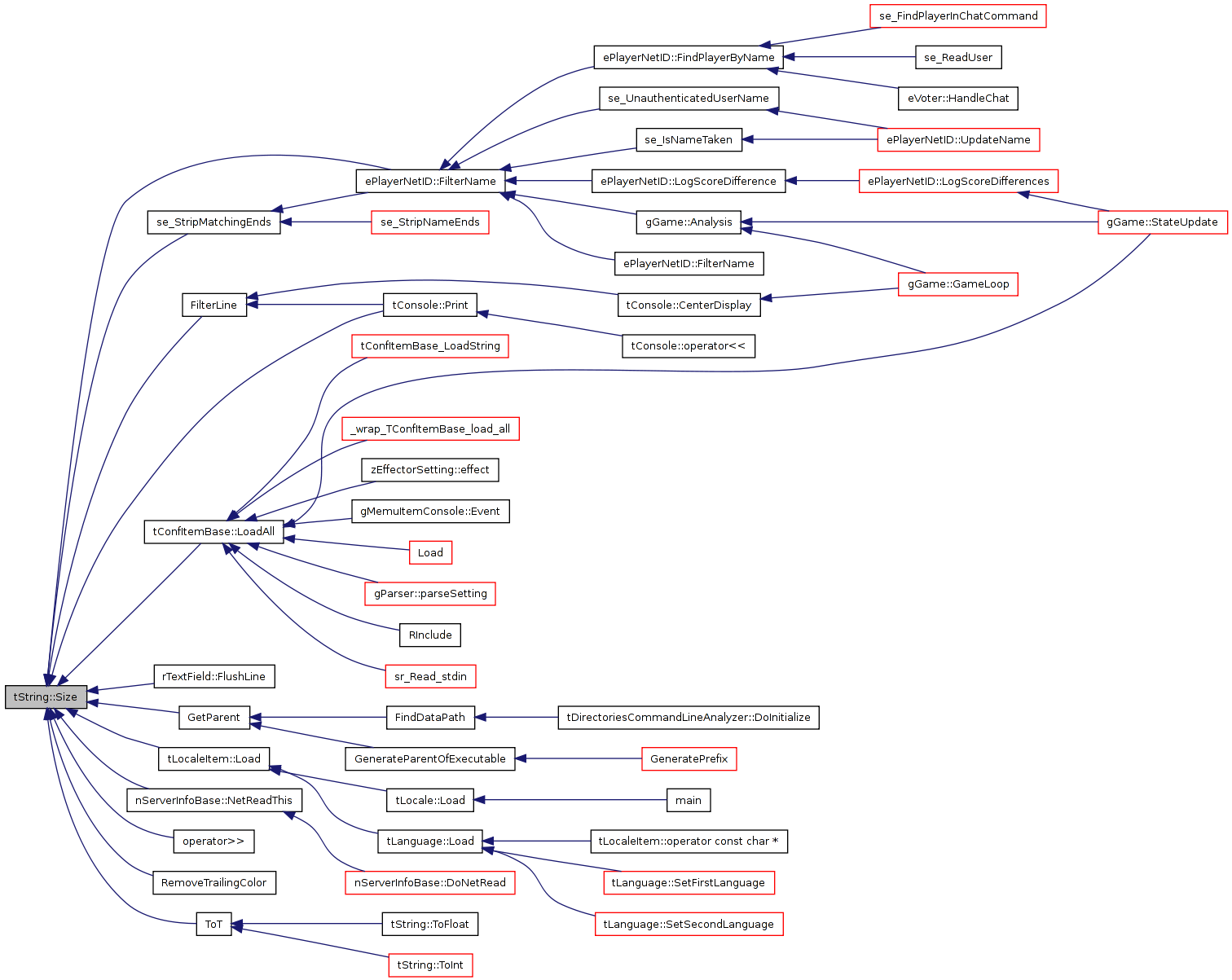
| bool tString::Convert | ( | T & | target, | |
| size_type | startPos = 0 | |||
| ) | const [inline] |
Converts the string to an arbitrary type, starting at the given position.
| target | the variable to write the conversion result to | |
| startPos | the position to start the conversion at |
Definition at line 276 of file tString.h.
Referenced by cWidget::WithDataFunctions::ProcessDataSource(), and ToT().
00277 { 00278 // generate string stream and advance it to the start position 00279 std::istringstream s(*this); 00280 s.seekg(startPos); 00281 00282 // read it 00283 s >> target; 00284 00285 // return failure condition 00286 return !s.fail() && s.eof() || isspace(s.get()); 00287 }

| void tString::ReadLine | ( | std::istream & | s, | |
| bool | enableEscapeSequences = false | |||
| ) |
read a whole line from a stream into this string
| s | stream to read from | |
| enableEscapeSequences | set to true if escape sequences ( ) shall be respected |
Definition at line 411 of file tString.cpp.
References c, Clear(), isblank(), and st_ReadEscapeSequence().
Referenced by tStatFile::flushWrites(), tTextFileRecorder::GetLine(), eVoter::HandleChat(), gAICharacter::Load(), tLocaleItem::Load(), nServerInfo::Load(), tConfItemBase::LoadAll(), tIniFile::LoadFile(), tConfItemBase::LoadLine(), tPlayList::LoadPlaylist(), nKrawall::nMethod::nMethod(), operator>>(), tStatFile::read(), tSettingRotation::ReadVal(), tConfItemLine::ReadVal(), nConfItemLine::ReadVal(), tConfItemPassword::ReadVal(), se_ChatMe(), se_ChatMsg(), se_ChatShuffle(), se_ChatTeam(), se_NeedsServer(), and st_Dummy().
00412 { 00413 char c=' '; 00414 Clear(); 00415 while(c!='\n' && c!='\r' && isblank(c) && s.good() && !s.eof()){ 00416 c=s.get(); 00417 } 00418 00419 s.putback(c); 00420 c='x'; 00421 00422 while( true ) 00423 { 00424 c=s.get(); 00425 00426 // notice end of line or file 00427 if ( c=='\n' || c=='\r' || !s.good() || s.eof()) 00428 break; 00429 00430 if ( enableEscapeSequences ) 00431 { 00432 char c2 = '\0'; 00433 if ( st_ReadEscapeSequence( c, c2, s ) ) 00434 { 00435 *this += c; 00436 c = 'x'; 00437 continue; 00438 } 00439 else if ( c2 ) 00440 { 00441 *this += c; 00442 *this += c2; 00443 c = 'x'; 00444 continue; 00445 } 00446 } 00447 00448 *this += c; 00449 } 00450 }
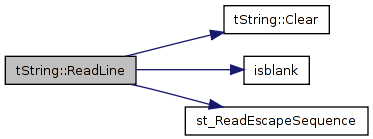
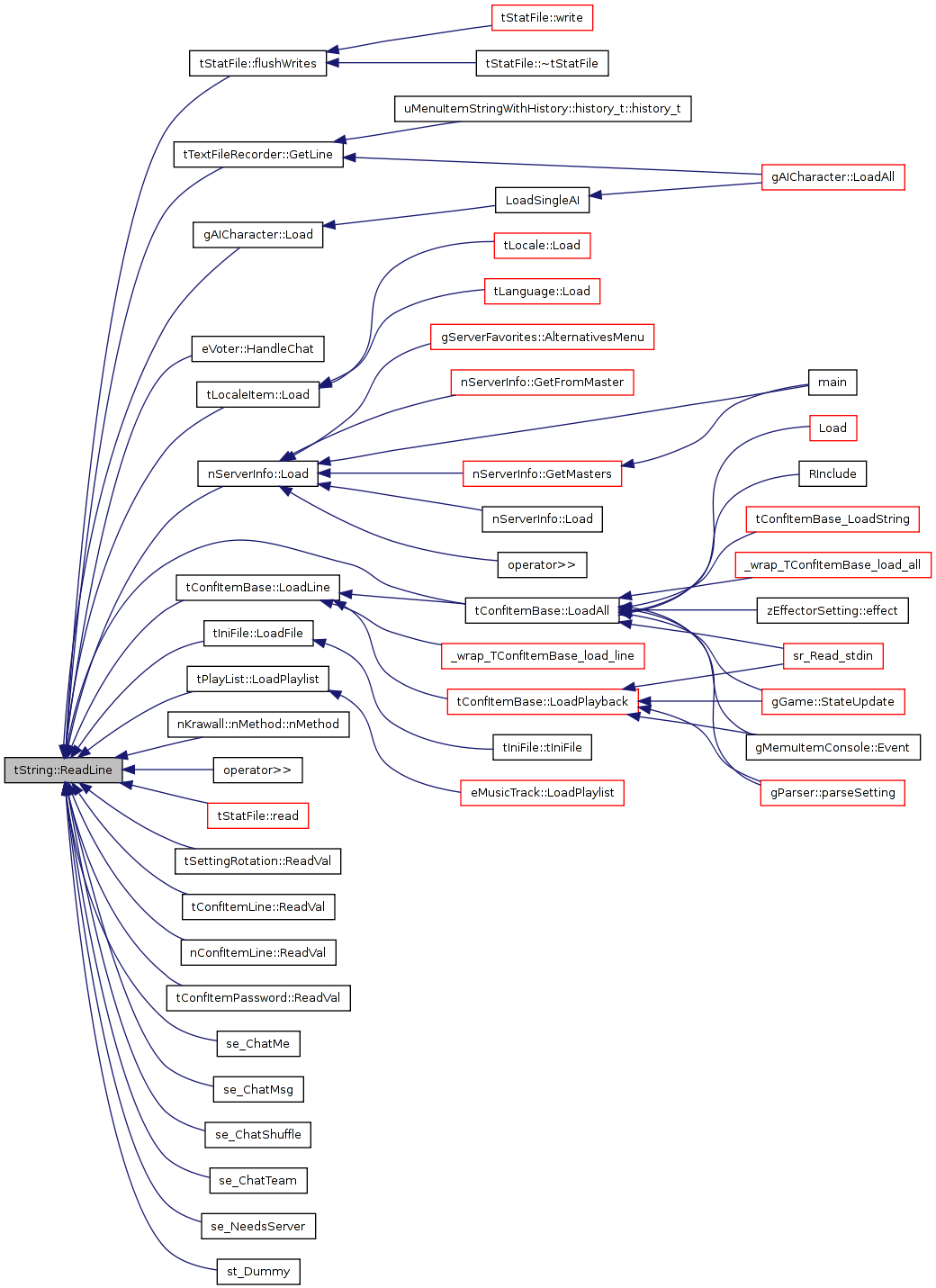
| void tString::Clear | ( | void | ) |
clears the string
Definition at line 461 of file tString.cpp.
Referenced by nServerInfo::DeleteAll(), eMenuItemKick::eMenuItemKick(), ePlayer::ePlayer(), nServerInfo::GetFromLAN(), nServerInfo::GetFromLANContinuously(), nAddress::GetHostname(), tLocale::Load(), tLocaleItem::Load(), tLanguage::Load(), lowlevel_sr_InitDisplay(), nServerInfo::NetReadThis(), tOutput::operator const char *(), tLocaleItem::operator const char *(), operator>>(), PasswordCallback(), ReadLine(), SetPos(), ePlayerNetID::UpdateName(), and rTextField::WriteChar().
00462 { 00463 #ifdef _MSC_VER 00464 *this = ""; 00465 #else 00466 string::clear(); 00467 #endif 00468 }
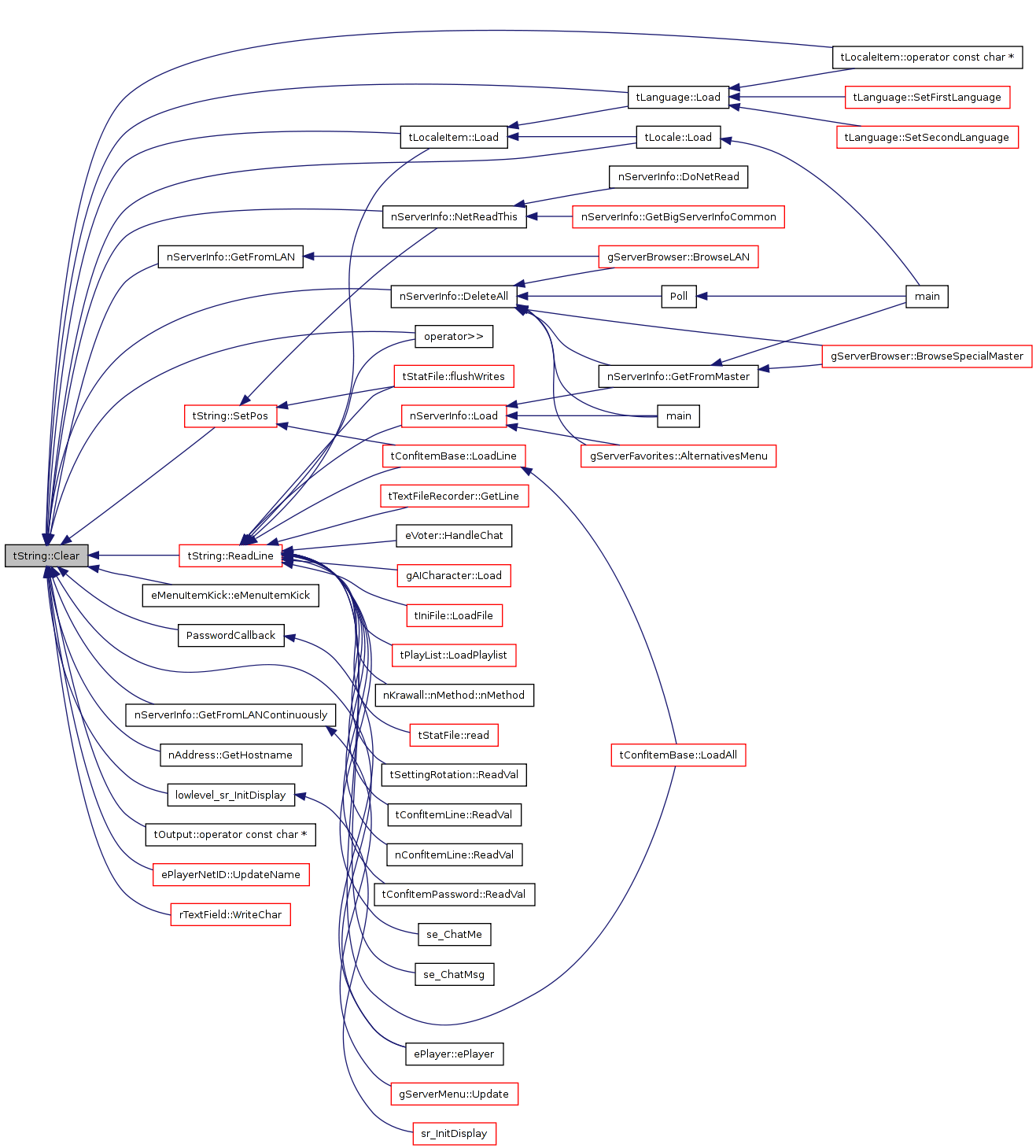
| void tString::SetPos | ( | int | l, | |
| bool | cut | |||
| ) |
makes this string exactly of length len.
| len | the target length | |
| cut | if set, the string may be cut back if its current length is bigger than length |
Reimplemented in tColoredString.
Definition at line 481 of file tString.cpp.
References Clear(), Len(), and SetSize().
Referenced by tConfItemBase::DocAll(), tStatFile::flushWrites(), tConfItemBase::LoadLine(), nServerInfo::NetReadThis(), eTeam::Ranking(), ePlayerNetID::Ranking(), and tColoredString::SetPos().
00481 { 00482 int i; 00483 if ( l < Len() ) 00484 { 00485 if ( cut ) 00486 { 00487 if ( l > 0 ) 00488 { 00489 SetSize( l-1 ); 00490 operator+=(' '); 00491 } 00492 else 00493 { 00494 Clear(); 00495 } 00496 } 00497 else 00498 { 00499 operator+=(' '); 00500 } 00501 } 00502 for(i=Len();i<l;i++) 00503 operator+=(' '); 00504 }

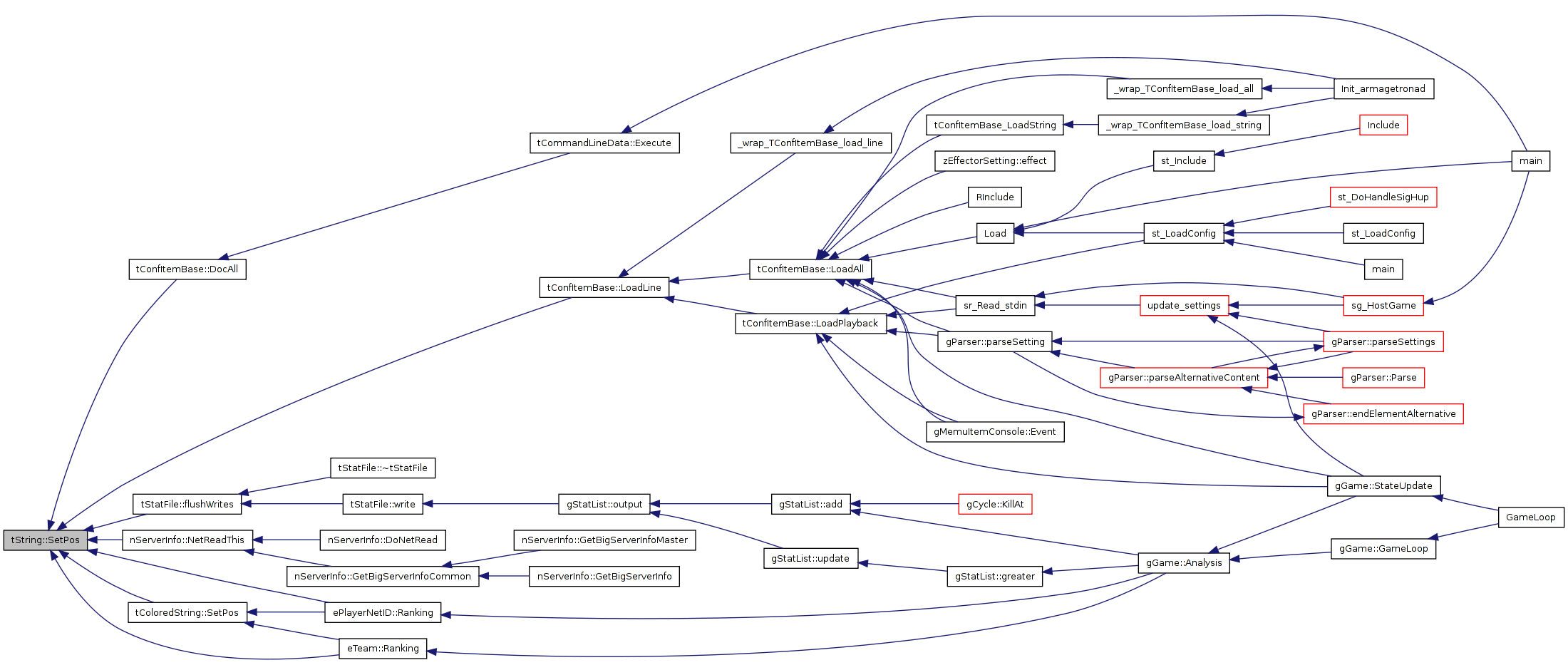
| bool tString::StartsWith | ( | const tString & | other | ) | const |
determines whether this string starts with the argument string
| other | the string to compare the start with |
Definition at line 522 of file tString.cpp.
References Len().
Referenced by EndsWith(), ExtractConnectionInformation(), tConfItemBase::LoadAll(), tIniFile::LoadFile(), tPlayList::LoadPlaylist(), s_Veto(), tXmlParserNamespace::sg_IgnoreRequest(), and st_RelocatePath().
00523 { 00524 // const tString & rmhxt = *this; 00525 // rmhxt.RemoveHex(); 00526 // *this = rmhxt; 00527 // other.RemoveHex(); 00528 if (other.Len() > Len()) { 00529 return false; 00530 } 00531 for (int i=0; i<other.Len()-1; i++) { 00532 if (other[i] != (*this)[i]) { 00533 return false; 00534 } 00535 } 00536 00537 return true; 00538 }


| bool tString::StartsWith | ( | const CHAR * | other | ) | const |
determines whether this string starts with the argument string
| bool tString::EndsWith | ( | const tString & | other | ) | const |
determines whether this string ends with the argument string
| other | the string to compare the end with |
Definition at line 571 of file tString.cpp.
References Len(), Reverse(), and StartsWith().
Referenced by tXmlParserNamespace::sg_IgnoreRequest().
00572 { 00573 if (other.Len() > Len()) { 00574 return false; 00575 } 00576 tString thisString = Reverse(); 00577 tString otherString(other); 00578 otherString = otherString.Reverse(); 00579 00580 // Haha, just use StartsWith to do the comparison :) 00581 return thisString.StartsWith(otherString); 00582 //return true; 00583 }


| bool tString::EndsWith | ( | const CHAR * | other | ) | const |
determines whether this string ends with the argument string
| tString tString::LTrim | ( | void | ) | const |
returns a copy with leading whitespace removed
Definition at line 606 of file tString.cpp.
References isblank().
Referenced by RTrim(), and Trim().
00607 { 00608 tString toReturn; 00609 bool trim = true; 00610 00611 for( size_t i = 0; i<size(); i++ ) 00612 { 00613 if( !isblank((*this)[i]) ) 00614 trim = false; 00615 if( !trim) 00616 toReturn << (*this)[i]; 00617 } 00618 return toReturn; 00619 }


| tString tString::RTrim | ( | void | ) | const |
returns a copy with trailing whitespace removed
Definition at line 631 of file tString.cpp.
References LTrim(), and Reverse().
Referenced by Trim().
00632 { 00633 tString toReturn; 00634 toReturn = Reverse(); 00635 00636 toReturn = toReturn.LTrim(); 00637 return toReturn.Reverse(); 00638 }


| tString tString::Trim | ( | void | ) | const |
returns a copy with leading and trailing whitespace removed
Definition at line 650 of file tString.cpp.
References LTrim(), and RTrim().
Referenced by tIniFile::LoadFile(), and tPlayList::LoadPlaylist().

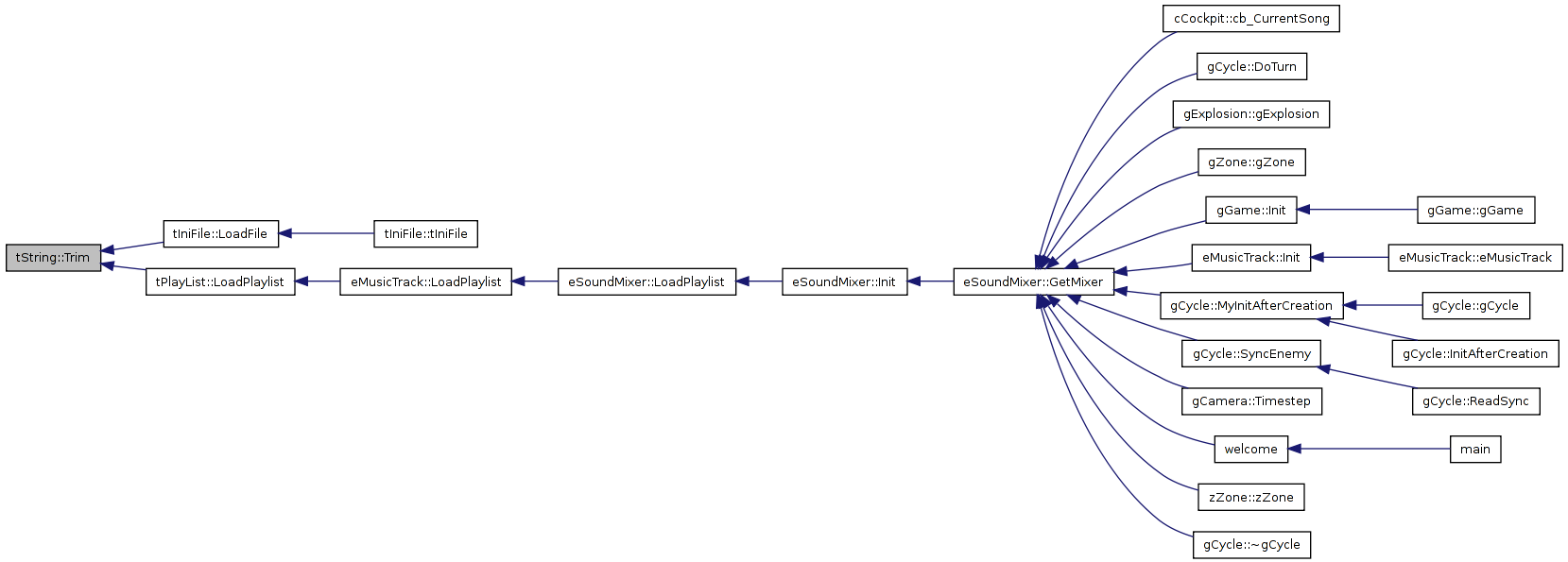
| int tString::StrPos | ( | const tString & | tofind | ) | const |
Get the position of a substring within this string.
| tofind | the string to find |
Definition at line 666 of file tString.cpp.
References Len().
Referenced by nAddress::FromString(), tIniFile::LoadFile(), tSettingRotation::ReadVal(), StrPos(), tIsInList(), and gServerMenu::Update().
00667 { 00668 if (tofind.Len() > Len()) { 00669 return -1; 00670 } 00671 for (int i=0; i<Len()-1; i++) { 00672 if ((*this)(i) == tofind(0)) { 00673 bool found = true; 00674 for (int j=0; j<tofind.Len()-1; j++) { 00675 if ((*this)(i+j) != tofind(j)) 00676 found = false; 00677 } 00678 if (found == true) 00679 return i; 00680 } 00681 } 00682 00683 return -1; 00684 }


| int tString::StrPos | ( | int | start, | |
| const tString & | tofind | |||
| ) | const |
Get the position of a substring within this string.
Definition at line 686 of file tString.cpp.
References Len().
00687 { 00688 if (tofind.Len() > Len()) { 00689 return -1; 00690 } 00691 for (int i = start; i<Len()-1; i++) { 00692 if ((*this)(i) == tofind(0)) { 00693 bool found = true; 00694 for (int j=0; j<tofind.Len()-1; j++) { 00695 if ((*this)(i+j) != tofind(j)) 00696 found = false; 00697 } 00698 if (found == true) 00699 return i; 00700 } 00701 } 00702 00703 return -1; 00704 }

| int tString::StrPos | ( | const CHAR * | tofind | ) | const |
Get the position of a substring within this string.
| tofind | the string to find |
Definition at line 717 of file tString.cpp.
References StrPos().

| int tString::StrPos | ( | int | start, | |
| const CHAR * | tofind | |||
| ) | const |
Get the position of a substring within this string.
Definition at line 722 of file tString.cpp.
References StrPos().

| tString tString::SubStr | ( | int | start, | |
| int | len | |||
| ) | const |
Get an arbitrary substring within this string.
| start | start of string to extract | |
| len | length of string to extract |
Definition at line 739 of file tString.cpp.
References Len(), tASSERT, and tString().
Referenced by uMenuItemString::Event(), ExtractConnectionInformation(), FilterLine(), rTextField::FlushLine(), nAddress::FromString(), GeneratePrefix(), eSoundMixer::GetCurrentSong(), GetFileMimeExtension(), tConfItemBase::LoadAll(), tIniFile::LoadFile(), vValue::Registry::Registration::match(), uMenu::Message(), nServerInfoBase::NetReadThis(), PosWordRight(), tSettingRotation::ReadVal(), RemoveSubStr(), reparseforbiddencallbacks(), se_DisplayChatLocallyClient(), se_StripMatchingEnds(), SetLen(), SetSize(), st_RelocatePath(), SubStr(), tIsInList(), Truncate(), and ePlayerNetID::UpdateName().
00740 { 00741 tASSERT( start >= 0 ); 00742 00743 if (start > Len()) 00744 return tString(""); 00745 00746 //if len < 0 or too long, take the whole string 00747 if ( (len + start) >= Len() || len < 0) 00748 len = Len() - start - 1; 00749 00750 tString toReturn(""); 00751 00752 for (int i=start; i<(len + start); i++) { 00753 toReturn << (*this)(i); 00754 } 00755 return toReturn; 00756 }

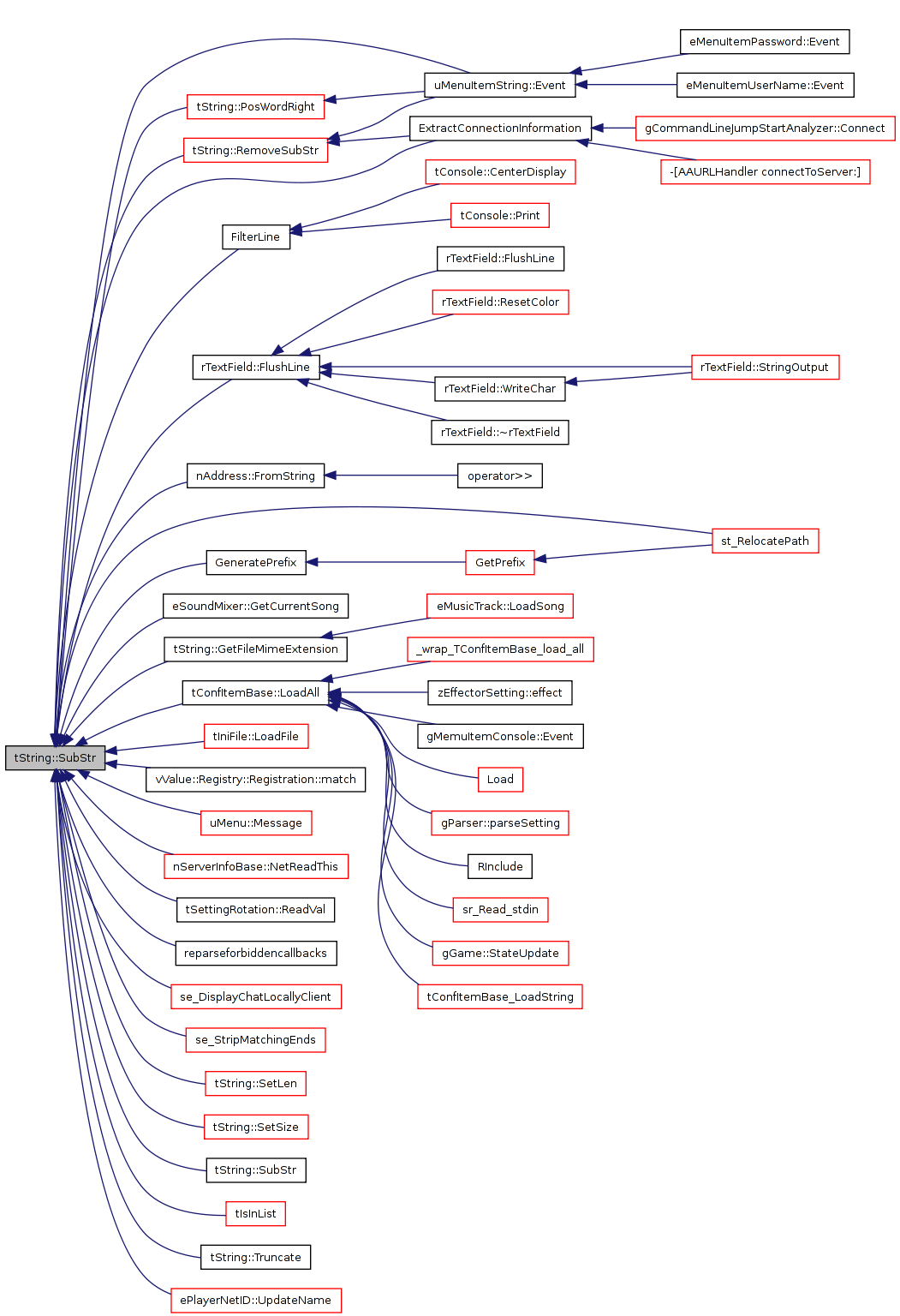
| tString tString::SubStr | ( | int | start | ) | const |
Get a substring within this string from the end.
| start | start of string to extract |
Definition at line 769 of file tString.cpp.
References Len(), and SubStr().

| int tString::ToInt | ( | size_type | pos = 0 |
) | const |
Returns the string converted to an integer.
| pos | position to start looking at for a number |
Definition at line 807 of file tString.cpp.
References ToT().
Referenced by gCommandLineJumpStartAnalyzer::Connect(), AAURLHandler::connectToServer:, nAddress::FromString(), and se_ChatShuffle().


| REAL tString::ToFloat | ( | size_type | pos = 0 |
) | const |
Returns the string converted to a float.
| pos | position to start looking at for a number |
Definition at line 825 of file tString.cpp.

Compares two strings alphanumerically.
| a | first string to compare | |
| b | second string to compare |
Definition at line 866 of file tString.cpp.
References GetInt(), and Len().
00867 { 00868 int apos = 0; 00869 int bpos = 0; 00870 00871 while ( apos < a.Len() && bpos < b.Len() ) 00872 { 00873 int adigit = GetInt( a,apos ); 00874 int bdigit = GetInt( b,bpos ); 00875 if ( adigit < bdigit ) 00876 return 1; 00877 else if ( adigit > bdigit ) 00878 return -1; 00879 } 00880 00881 if ( a.Len() - apos < b.Len() - bpos ) 00882 return 1; 00883 else if ( a.Len() - apos > b.Len() - bpos ) 00884 return 1; 00885 else 00886 return 0; 00887 }

| tString tString::StripWhitespace | ( | void | ) | const |
Strips all whitespace from a string.
Definition at line 899 of file tString.cpp.
References isblank(), and Len().
Referenced by tIniFile::LoadFile().
00900 { 00901 tString toReturn; 00902 00903 for( int i = 0; i<=Len()-2; i++ ) 00904 { 00905 if( !isblank((*this)(i)) ) 00906 toReturn << (*this)(i); 00907 } 00908 return toReturn; 00909 }


| tString tString::ToLower | ( | void | ) | const |
Converts the string to lowercase.
Definition at line 912 of file tString.cpp.
Referenced by tConfItemBase::GetCommands(), and cWidget::WithDataFunctions::ProcessDataSource().
00912 { 00913 tString ret(*this); 00914 for(iterator iter=ret.begin(); iter!=ret.end(); ++iter) { 00915 *iter = tolower(*iter); 00916 } 00917 return ret; 00918 }

| tString tString::ToUpper | ( | void | ) | const |
Converts the string to uppercase.
Definition at line 921 of file tString.cpp.
Referenced by tConfItemBase::FindConfigItem().
00921 { 00922 tString ret(*this); 00923 for(iterator iter=ret.begin(); iter!=ret.end(); ++iter) { 00924 *iter = toupper(*iter); 00925 } 00926 return ret; 00927 }

| int tString::PosWordRight | ( | int | start | ) | const |
Computes the position of the next delimiter relative to start.
| start | The location of right to search |
Definition at line 955 of file tString.cpp.
References delimiters, Len(), and SubStr().
Referenced by uMenuItemString::Event(), PosWordLeft(), and RemoveWordRight().
00955 { 00956 int nextDelimiter = strcspn( SubStr( start, Len() ), delimiters ); 00957 int toMove = nextDelimiter; 00958 00959 // A delimter in our immediate path 00960 if ( toMove == 0 ) { 00961 // Move over delimiters 00962 while ( nextDelimiter == 0 && start + 1 < Len() ) { 00963 toMove++; 00964 start++; 00965 nextDelimiter = strcspn( SubStr( start, Len() ), delimiters ); 00966 } 00967 // Skip over the word if not multiple delimiters 00968 if ( toMove == 1 ) { 00969 toMove += nextDelimiter; 00970 } 00971 } 00972 00973 return toMove; 00974 }


| int tString::PosWordLeft | ( | int | start | ) | const |
Computes the position of the previous delimiter relative to start.
| start | The location of left to search |
Definition at line 987 of file tString.cpp.
References Len(), PosWordRight(), and Reverse().
Referenced by uMenuItemString::Event(), and RemoveWordLeft().
00987 { 00988 return -1 * Reverse().PosWordRight( Len() - start - 1 ); 00989 }


| int tString::RemoveWordRight | ( | int | start | ) |
Remove word right according to the delimiters.
| start | The location to start removing from |
Definition at line 1004 of file tString.cpp.
References PosWordRight(), and RemoveSubStr().
Referenced by uMenuItemString::Event().
01004 { 01005 int removed = PosWordRight( start ); 01006 RemoveSubStr( start, removed ); 01007 return removed; 01008 }
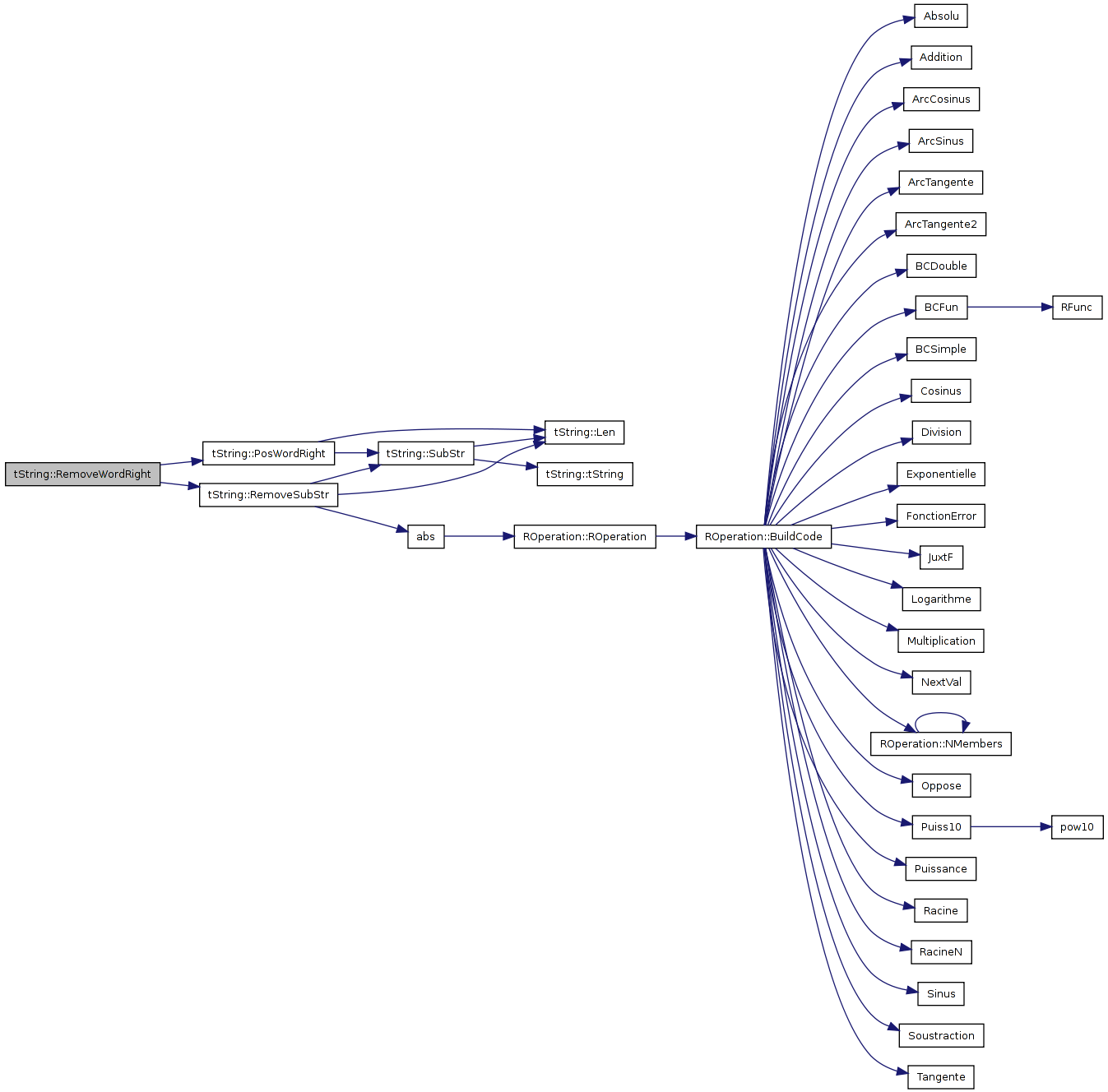

| int tString::RemoveWordLeft | ( | int | start | ) |
Remove word left according to the delimiters.
| start | The location to start removing from |
Definition at line 1023 of file tString.cpp.
References PosWordLeft(), and RemoveSubStr().
Referenced by uMenuItemString::Event().
01023 { 01024 int removed = PosWordLeft( start ); 01025 RemoveSubStr( start, removed ); 01026 return removed; 01027 }
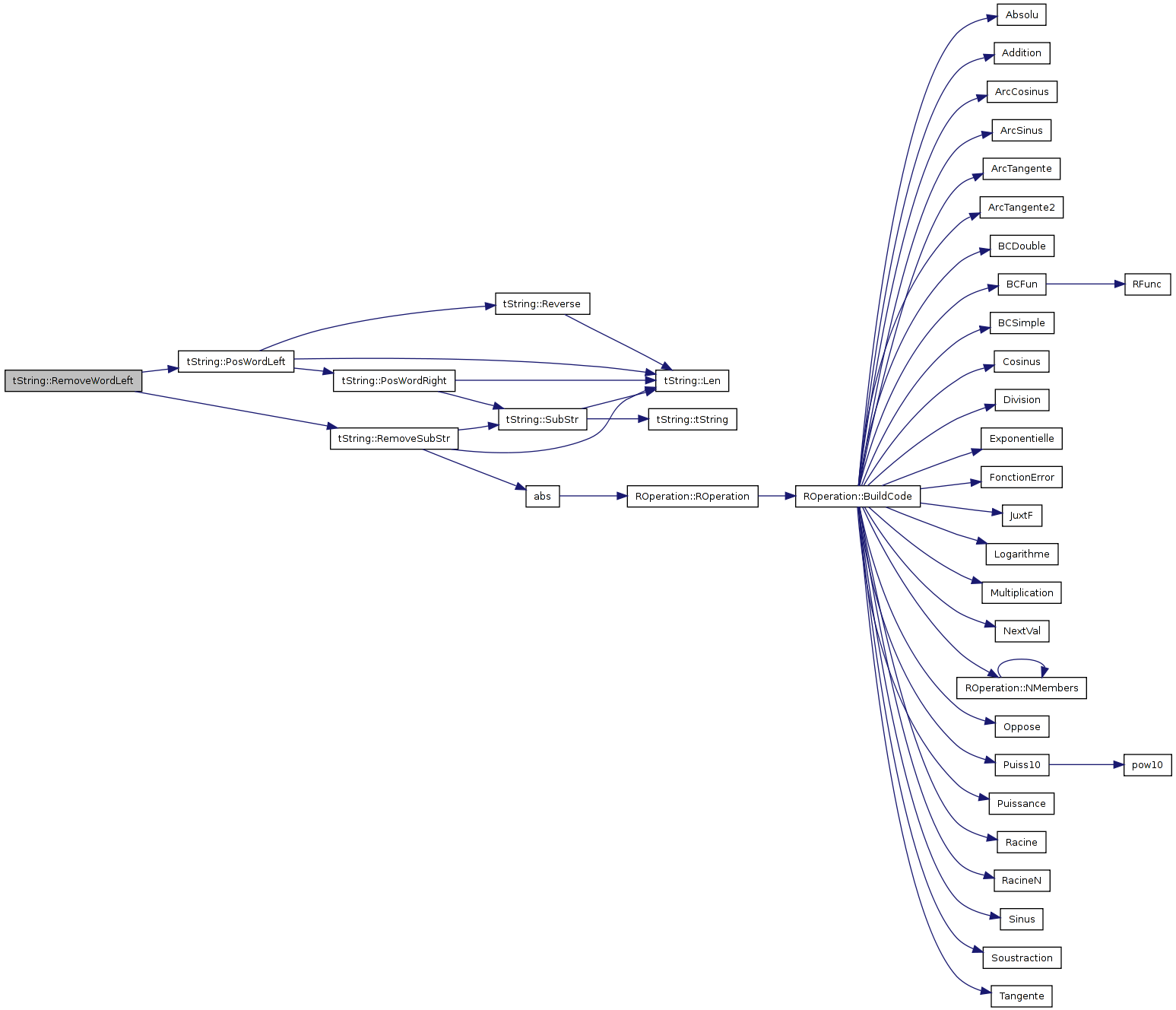

| void tString::RemoveSubStr | ( | int | start, | |
| int | length | |||
| ) |
Remove a substring, in-place.
| start | The position in the string | |
| length | How many characters to delete and the direction. x > 0 deletes right x < 0 deletes left |
Definition at line 1042 of file tString.cpp.
References abs(), Len(), and SubStr().
Referenced by uMenuItemString::Event(), ExtractConnectionInformation(), RemoveWordLeft(), and RemoveWordRight().
01042 { 01043 int strLen = Len()-1; 01044 if ( length < 0 ) { 01045 start += length; 01046 length = abs( length ); 01047 } 01048 01049 if ( start + length > strLen || start < 0 || length == 0 ) { 01050 return; 01051 } 01052 01053 if ( start == 0 ) { 01054 if ( strLen - length == 0 ) { 01055 *this = (""); 01056 } 01057 else { 01058 *this = SubStr( start + length, strLen ); 01059 } 01060 } 01061 else { 01062 *this = SubStr( 0, start ) + SubStr( start + length, strLen ); 01063 } 01064 01065 // SetSze(strLen+1-length); 01066 }
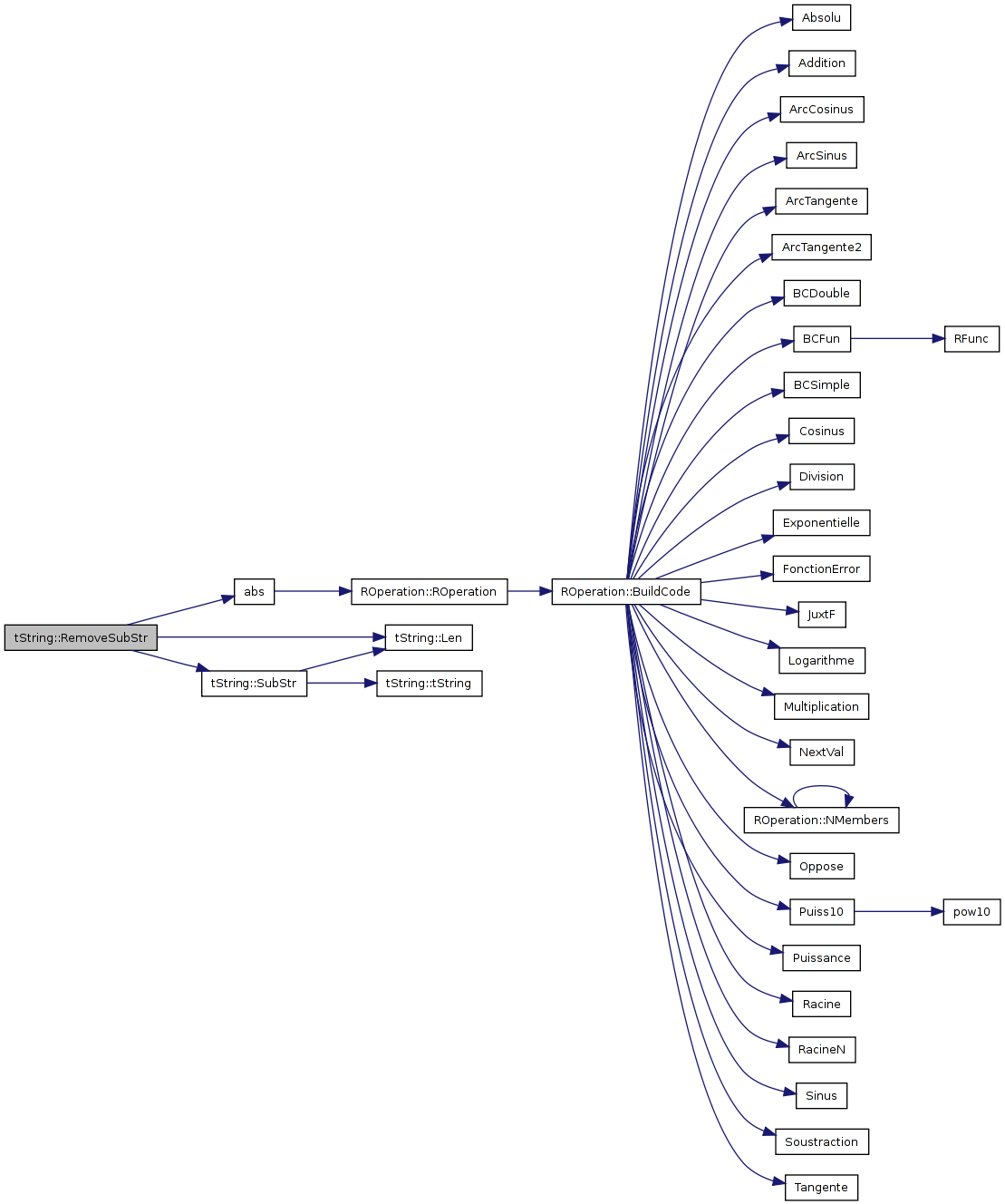

| tString tString::GetFileMimeExtension | ( | ) | const |
Gets the lowercased file extension, as in a MIME type.
| none |
Definition at line 1080 of file tString.cpp.
References Len(), Reverse(), SubStr(), and tString().
Referenced by eMusicTrack::LoadSong().
01080 { 01081 tString extension; 01082 int currentPosition = Len(); 01083 01084 bool goonie = true; 01085 01086 if( currentPosition < 2 ) return tString(""); 01087 01088 while(goonie) { 01089 extension += SubStr(currentPosition,1); 01090 if( SubStr(currentPosition,1) == "." ) goonie = false; 01091 currentPosition--; 01092 } 01093 01094 extension = extension.Reverse(); 01095 if( extension == (*this) ) return tString(""); 01096 01097 for(size_t i=0; i<extension.size(); i++) 01098 extension[i] = tolower(extension[i]); 01099 return extension; 01100 }


| tString tString::Reverse | ( | ) | const |
Reverses strings.
Definition at line 1112 of file tString.cpp.
References Len().
Referenced by EndsWith(), GetFileMimeExtension(), PosWordLeft(), and RTrim().
01112 { 01113 tString reversed; 01114 for ( int index = Len() - 2; index >= 0; index-- ) { 01115 reversed << ( *this ) ( index ); 01116 } 01117 01118 return reversed; 01119 }


| tString tString::Truncate | ( | int | truncateAt | ) | const |
Returns a truncated string (copy of this with excess chars replaced by "...").
| truncateAt | The postion to truncate at |
Definition at line 1134 of file tString.cpp.
References Len(), and SubStr().
01135 { 01136 // The string does not need to be truncated 01137 if ( truncateAt >= Len() ) 01138 return *this; 01139 01140 return SubStr( 0, truncateAt ) + "..."; 01141 }

| tString::CHAR tString::operator[] | ( | size_t | i | ) | const |
| i | position to look up |
Definition at line 1154 of file tString.cpp.
References tASSERT.
Referenced by operator[]().
01155 { 01156 tASSERT( i <= size() ); 01157 return BASE::operator[]( i ); 01158 }

| tString::CHAR & tString::operator[] | ( | size_t | i | ) |
| i | position to look up |
Definition at line 1171 of file tString.cpp.
References tERR_MESSAGE.
01172 { 01173 while( i >= size() ) 01174 { 01175 *this += ' '; 01176 #ifdef DEBUG 01177 static bool warn = true; 01178 if( warn ) 01179 { 01180 warn = false; 01181 tERR_MESSAGE("Auto-expanding string, this functionality will go away."); 01182 } 01183 #endif 01184 } 01185 01186 return BASE::operator[](i); 01187 }
| tString::CHAR tString::operator[] | ( | int | i | ) | const |
| i | position to look up |
Definition at line 1200 of file tString.cpp.
References operator[]().
01201 { 01202 return operator[]( size_t(i) ); 01203 }

| tString::CHAR & tString::operator[] | ( | int | i | ) |
| i | position to look up |
Definition at line 1216 of file tString.cpp.
References operator[]().
01217 { 01218 return operator[]( size_t(i) ); 01219 }

| void tString::SetSize | ( | unsigned int | len | ) |
sets the string length by cutting or appending spaces
| len | the desired length |
Definition at line 1388 of file tString.cpp.
References SubStr(), and tASSERT.
Referenced by RemoveTrailingColor(), and SetPos().
01389 { 01390 tASSERT(len < 268435456); 01391 01392 while ( len > size() ) 01393 *this += ' '; 01394 if ( len < size() ) 01395 *this = SubStr( 0, len ); 01396 01397 tASSERT( size() == len ); 01398 }

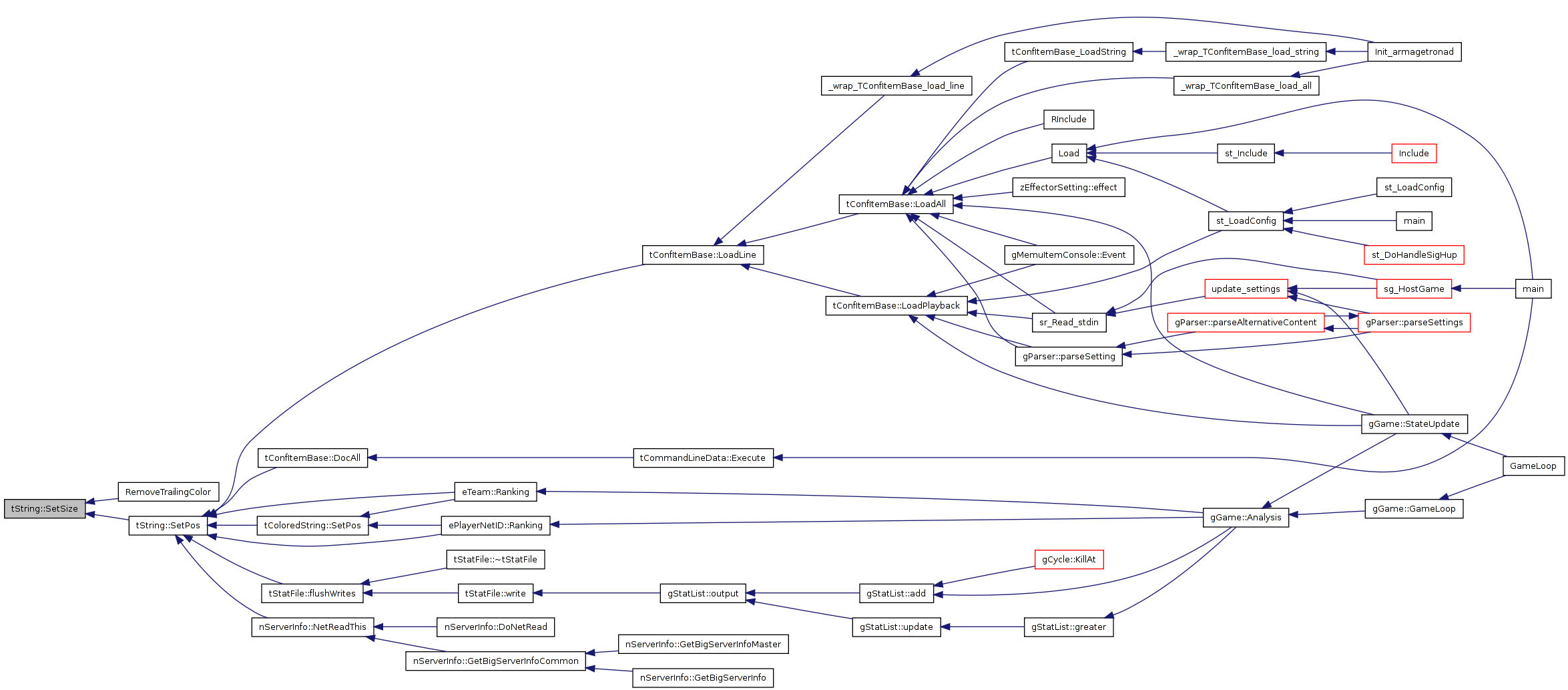
| tString::CHAR tString::operator() | ( | size_t | i | ) | const |
| i | position to look up |
Definition at line 1232 of file tString.cpp.
References tASSERT.
Referenced by operator()().
01233 { 01234 tASSERT( i <= size() ); 01235 return BASE::operator[]( i ); 01236 }

| tString::CHAR & tString::operator() | ( | size_t | i | ) |
| i | position to look up |
Definition at line 1249 of file tString.cpp.
References tASSERT.
01250 { 01251 tASSERT( i < size() ); 01252 return BASE::operator[]( i ); 01253 }
| tString::CHAR tString::operator() | ( | int | i | ) | const |
| i | position to look up |
Definition at line 1266 of file tString.cpp.
References operator()().
01267 { 01268 return operator()( size_t(i) ); 01269 }

| tString::CHAR & tString::operator() | ( | int | i | ) |
| i | position to look up |
Definition at line 1282 of file tString.cpp.
References operator()().
01283 { 01284 return operator()( size_t(i) ); 01285 }

| int tString::Compare | ( | const CHAR * | other | ) | const |
Compares two strings lexicographically.
Referenced by vValue::Registry::Registration::match().

| int tString::Compare | ( | const CHAR * | other, | |
| bool | ignoreCase | |||
| ) | const |
Compares two strings lexicographically, ignoring case differences if second argument is true.
| tString::operator const tString::CHAR * | ( | void | ) | const |
| int tString::Count | ( | CHAR | what | ) | const |
Counts the number of a certain character within the string.
| what | the character that is searched for |
Definition at line 931 of file tString.cpp.
Referenced by rConsole::Render().
00931 { 00932 int ret = 0; 00933 for(const_iterator iter=begin(); iter!=end(); ++iter) { 00934 if (*iter == what) 00935 ret++; 00936 } 00937 return ret; 00938 }

| int tString::LongestLine | ( | void | ) | const |
the length of the longest line
Reimplemented in tColoredString.
Definition at line 1359 of file tString.cpp.
References pos.
01359 { 01360 unsigned longest = 0; 01361 unsigned pos = 0; 01362 int l; 01363 while ((l=find_first_of('\n', pos)) != -1) { 01364 if(l-pos > longest) 01365 longest = l-pos; 01366 pos = l+1; 01367 } 01368 if(size() - pos > longest) 01369 longest = size() - pos; 01370 return longest; 01371 }
| int tString::Len | ( | void | ) | const |
returns the lenghth PLUS ONE (the allocated length)
Definition at line 1353 of file tString.cpp.
Referenced by tCommandLineData::Analyse(), nKrawall::BrokenScramblePassword(), CompareAlphaNumerical(), ConnectToServerCore(), EndsWith(), ePlayer::ePlayer(), uMenuItemString::Event(), ExtractConnectionInformation(), tStatFile::flushWrites(), GeneratePrefix(), tPathResource::GetDirPath(), GetFileMimeExtension(), tDirectories::GetFiles(), GetInt(), nQueryMessageStats::GetIP(), GetMyHostName(), nServerInfo::GetSmallServerInfo(), IsLegalPlayerName(), tLanguage::Load(), eWavData::Load(), tConfItemBase::LoadAll(), tIniFile::LoadFile(), tPlayList::LoadPlaylist(), uMenu::Message(), eVoter::Name(), NetFilter(), nServerInfo::NetReadThis(), nServerInfoBase::NetReadThis(), tResourceManager::openResource(), tLocaleItem::operator const char *(), operator<<(), PasswordCallback(), tPathResource::Paths(), tPathScreenshot::Paths(), tPathVar::Paths(), tPathData::Paths(), tPathConfig::Paths(), PosWordLeft(), PosWordRight(), RemoveSubStr(), gServerMenuItem::RenderBackground(), ReplacePath(), Reverse(), nServerInfo::Save(), se_AppendChat(), se_ChatShuffle(), se_EscapeName(), se_IsNameTaken(), se_ListPlayers(), se_OptionalNameFilters(), se_RequestLogin(), se_StripMatchingEnds(), se_VoteKickUser(), SetLen(), SetPos(), sg_NetworkError(), tXmlParserNamespace::st_ErrorFunc(), st_RelocatePath(), StartsWith(), StripWhitespace(), StrPos(), SubStr(), tIsInList(), Truncate(), tStringLessThan(), tToLower(), tToUpper(), uMenuItemString::uMenuItemString(), gServerMenu::Update(), eTeam::UpdateAppearance(), ePlayerNetID::UpdateName(), tConfItemLine::WriteVal(), and uMenuItemStringWithHistory::~uMenuItemStringWithHistory().
| void tString::SetLen | ( | int | len | ) |
sets the allocated length
Legacy function, don't use.
| len | the desired length (including the trailing ) |
Definition at line 1411 of file tString.cpp.
References Len(), st_Breakpoint(), SubStr(), and tASSERT.
Referenced by se_AppendChat().
01412 { 01413 // legacy function, don't use 01414 st_Breakpoint(); 01415 01416 while ( len > Len() ) 01417 *this += ' '; 01418 if ( len < Len() ) 01419 *this = SubStr( 0, len ); 01420 01421 tASSERT( Len() == len ); 01422 }


| void tString::NetFilter | ( | void | ) |
filters strings from the net for strange things like newlines
Definition at line 1646 of file tString.cpp.
References tCharacterFilter::Filter(), filter(), and Len().
Referenced by nServerInfo::DoGetFrom(), nAuthentication::HandlePasswordRequest(), ePlayerNetID::SetName(), and sn_ReadFiltered().
01647 { 01648 static tCharacterFilter filter; 01649 01650 // run through string 01651 for( int i = Len()-2; i>=0; --i ) 01652 { 01653 // character to filter 01654 char & my = (*this)(i); 01655 01656 my = filter.Filter(my); 01657 } 01658 }
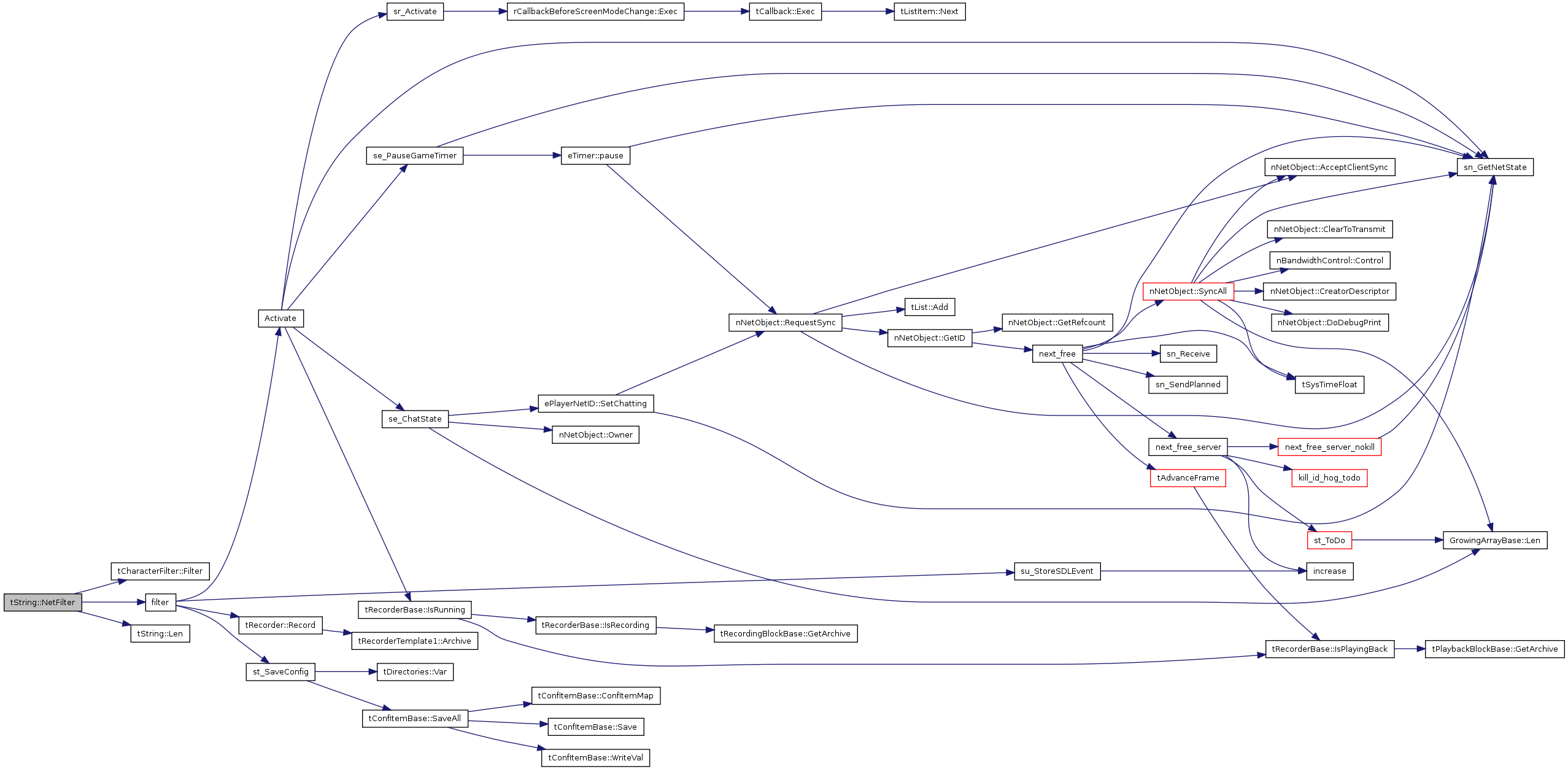

 1.5.4
1.5.4